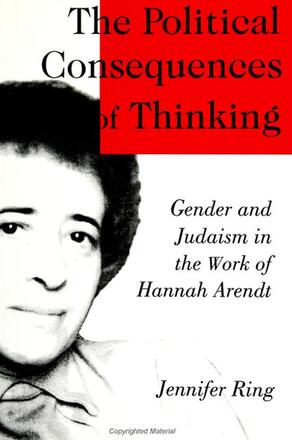
The Political Consequences of Thinking
Gender and Judaism in the Work of Hannah Arendt
Alternative formats available from:
Applies the perspectives of gender and ethnicity in a feminist analysis of the Eichmann controversy and offers a wholly new interpretation of Arendt's work, from Eichmann in Jerusalem to The Life of the Mind.
Description
In this book, Jennifer Ring offers a wholly new interpretation of Hannah Arendt's work, from Eichmann in Jerusalem, with its bitter reception by the Jewish community, to The Life of the Mind. Departing from previous scholarship, Ring applies the perspectives of gender and ethnicity to investigate the extent to which Arendt's identity as a Jewish woman influenced both her thought and its reception.
Ring's analysis of Zionist and assimilationist responses to century-old antisemitic sexual stereotypes leads her to argue that Arendt's criticism of European Jewish leadership during the Holocaust was bound to be explosive. New York and Israeli Jews shared a rare moment of unity in their condemnation of Arendt, charging that she had betrayed the Jewish community—the kind of charge, Ring contends, often leveled against women who dare to speak out publicly against prominent men in their own cultural or racial groups.
The book moves from a feminist analysis of the Eichmann controversy to a discussion of Jewish themes in the structure and content of Arendt's major theoretical works. Ring makes a powerful contribution to an understanding of Arendt, and of multiculturalism, demonstrating that Arendt's most sustained philosophical work was influenced as much by her Jewish heritage as by her German education.
Jennifer Ring is Associate Professor of Political Science and Director of Women's Studies, University of Nevada, Reno, and has taught at Columbia University, Stanford University, the University of South Carolina, and the University of California at Berkeley. She is the author of Modern Political Theory and Contemporary Feminism: A Dialectical Analysis, also published by SUNY Press.
Reviews
"There is now a fast-growing library of Arendt commentaries, expositions, critiques, and quarrels, but Jennifer Ring's book is something else; an engagement. She thinks along with her subject—both giving and growing in the exciting process." — Elisabeth Young-Bruehl, Haverford College, author of Hannah Arendt: For the Love of the World
"A hard-hitting, learned, and original analysis of a problem that has been largely neglected in Arendt scholarship. Some readers will love it and others will hate it, but it is a major contribution that no one interested in Arendt's career will be able to ignore. It provides a valuable corrective to the two dominant readings of Arendt in the literature: Arendt as existentialist/phenomenologist and Arendt as Grecophile/republican. This is a mature work by a mature scholar who has been thinking about and working with Arendt's ideas for some time." — Sandra Hinchman, St. Lawrence University, coeditor of Hannah Arendt: Critical Essays
"This is a challenging, original, and engaging piece. Ring touches upon crucial themes and issues with courage and theoretical sophistication. She is fully aware of the originality and significance of her claim. Great insights are captured beautifully; memorable ideas and articulation abound in this work." -- Alkis Kontos, University of Toronto